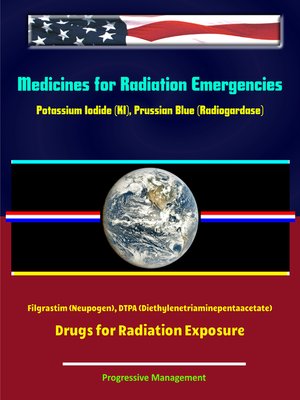Medicines for Radiation Emergencies
ebook ∣ Potassium Iodide (KI), Prussian Blue (Radiogardase), Filgrastim (Neupogen), DTPA (Diethylenetriaminepentaacetate)--Drugs for Radiation Exposure
By Progressive Management

Sign up to save your library
With an OverDrive account, you can save your favorite libraries for at-a-glance information about availability. Find out more about OverDrive accounts.
Find this title in Libby, the library reading app by OverDrive.



Search for a digital library with this title
Title found at these libraries:
| Loading... |
Four important medicines for treatment in radiation emergencies are fully covered in this authoritative collection of official documents: potassium iodide (KI), prussian blue, Filgrastim (Neupogen), and DTPA (Diethylenetriaminepentaacetate). There is detailed information from the FDA, CDC, NRC, and EPA on the use of these medicines.
Potassium iodide is a salt, similar to table salt. Its chemical symbol is KI. It is routinely added to table salt to make it "iodized." Potassium iodide, if taken in time and at the appropriate dosage, blocks the thyroid gland's uptake of radioactive iodine and thus could reduce the risk of thyroid cancers and other diseases that might otherwise be caused by exposure to radioactive iodine that could be dispersed in a severe nuclear accident. Potassium iodide is a special kind of protective measure in that it offers very specialized protection. Potassium iodide protects the thyroid gland against internal uptake of radioiodines that may be released in the unlikely event of a nuclear reactor accident. The purpose of radiological emergency preparedness is to protect people from the effects of radiation exposure after an accident at a nuclear power plant. Evacuation is the most effective protective measure in the event of a radiological emergency because it protects the whole body (including the thyroid gland and other organs) from all radionuclides and all exposure pathways. Administering KI can be a reasonable, prudent, and inexpensive supplement to in-place sheltering and evacuation.
Since the 1960s, Prussian blue has been used to treat people who have been internally contaminated with radioactive cesium (mainly Cs-137) and nonradioactive thallium (once an ingredient in rat poisons). Doctors can prescribe Prussian blue at any point after they have determined that a person who is internally contaminated would benefit from treatment. Prussian blue will help speed up the removal of cesium and thallium from the body. Prussian blue traps radioactive cesium and thallium (mainly Tl-201) in the intestines and keeps them from being re-absorbed by the body. The radioactive materials then move through the intestines and are excreted (passed) in bowel movements. Prussian blue reduces the biological half-life1 of cesium from about 110 days to about 30 days. Prussian blue reduces the biological half-life of thallium from about 8 days to about 3 days. Because Prussian blue reduces the time that radioactive cesium and thallium stay in the body, it helps limit the amount of time the body is exposed to radiation.
When a person has received a very high dose of radiation, destruction of the bone marrow, potentially resulting in uncontrolled bleeding and infection, is a major concern. To help the recovery of the bone marrow, growth factors that stimulate the blood cells to multiply can be used. Filgrastim (trade name Neupogen), is a drug that was approved for use by the FDA in 1991 for cancer patients with bone marrow damage due to chemotherapy or radiotherapy.
DTPA is a kind of medicine called a chelating agent. Chelating agents work by binding and holding on to radioactive materials or poisons that get into the body. Once bound to a radioactive material or poison, the chelating agent is then passed from the body in the urine. Chelating agents help decrease the amount of time it takes to get a poison out of the body.
This is a privately authored news service and educational publication of Progressive Management.






